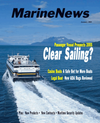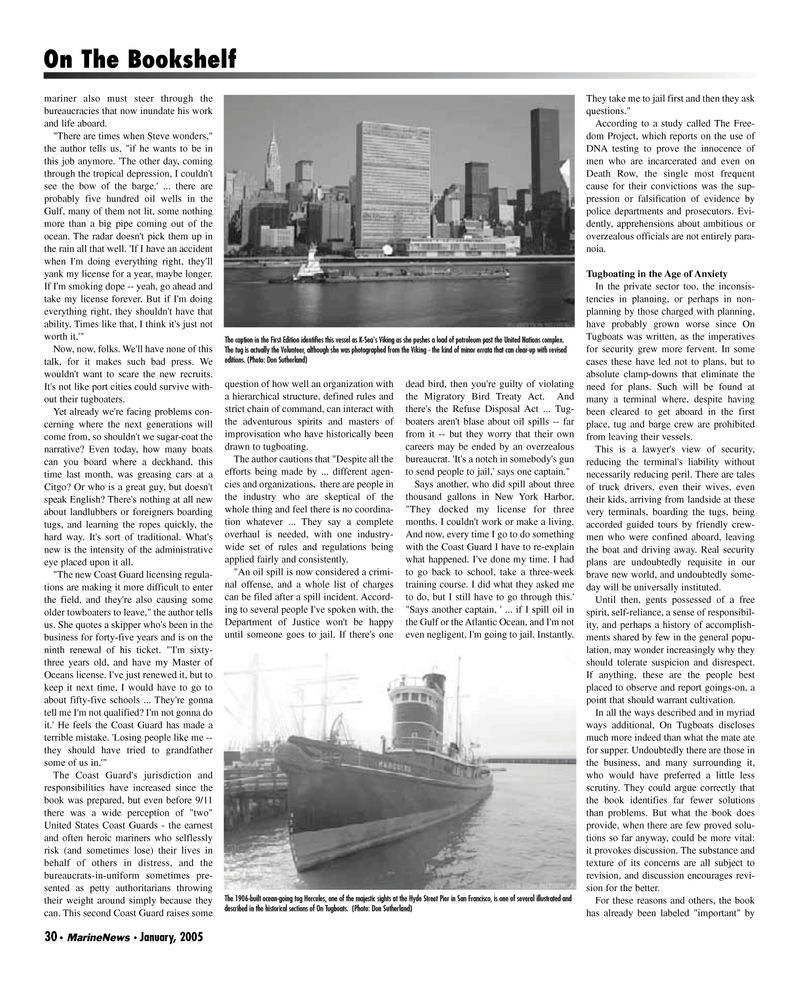
Page 30: of Marine News Magazine (January 2005)
Read this page in Pdf, Flash or Html5 edition of January 2005 Marine News Magazine
mariner also must steer through the bureaucracies that now inundate his work and life aboard. "There are times when Steve wonders," the author tells us, "if he wants to be in this job anymore. 'The other day, coming through the tropical depression, I couldn't see the bow of the barge.' ... there are probably five hundred oil wells in the
Gulf, many of them not lit, some nothing more than a big pipe coming out of the ocean. The radar doesn't pick them up in the rain all that well. 'If I have an accident when I'm doing everything right, they'll yank my license for a year, maybe longer.
If I'm smoking dope -- yeah, go ahead and take my license forever. But if I'm doing everything right, they shouldn't have that ability. Times like that, I think it's just not worth it.'"
Now, now, folks. We'll have none of this talk, for it makes such bad press. We wouldn't want to scare the new recruits.
It's not like port cities could survive with- out their tugboaters.
Yet already we're facing problems con- cerning where the next generations will come from, so shouldn't we sugar-coat the narrative? Even today, how many boats can you board where a deckhand, this time last month, was greasing cars at a
Citgo? Or who is a great guy, but doesn't speak English? There's nothing at all new about landlubbers or foreigners boarding tugs, and learning the ropes quickly, the hard way. It's sort of traditional. What's new is the intensity of the administrative eye placed upon it all. "The new Coast Guard licensing regula- tions are making it more difficult to enter the field, and they're also causing some older towboaters to leave," the author tells us. She quotes a skipper who's been in the business for forty-five years and is on the ninth renewal of his ticket. "'I'm sixty- three years old, and have my Master of
Oceans license. I've just renewed it, but to keep it next time, I would have to go to about fifty-five schools ... They're gonna tell me I'm not qualified? I'm not gonna do it.' He feels the Coast Guard has made a terrible mistake. 'Losing people like me -- they should have tried to grandfather some of us in.'"
The Coast Guard's jurisdiction and responsibilities have increased since the book was prepared, but even before 9/11 there was a wide perception of "two"
United States Coast Guards - the earnest and often heroic mariners who selflessly risk (and sometimes lose) their lives in behalf of others in distress, and the bureaucrats-in-uniform sometimes pre- sented as petty authoritarians throwing their weight around simply because they can. This second Coast Guard raises some question of how well an organization with a hierarchical structure, defined rules and strict chain of command, can interact with the adventurous spirits and masters of improvisation who have historically been drawn to tugboating.
The author cautions that "Despite all the efforts being made by ... different agen- cies and organizations, there are people in the industry who are skeptical of the whole thing and feel there is no coordina- tion whatever ... They say a complete overhaul is needed, with one industry- wide set of rules and regulations being applied fairly and consistently. "An oil spill is now considered a crimi- nal offense, and a whole list of charges can be filed after a spill incident. Accord- ing to several people I've spoken with, the
Department of Justice won't be happy until someone goes to jail. If there's one dead bird, then you're guilty of violating the Migratory Bird Treaty Act. And there's the Refuse Disposal Act ... Tug- boaters aren't blase about oil spills -- far from it -- but they worry that their own careers may be ended by an overzealous bureaucrat. 'It's a notch in somebody's gun to send people to jail,' says one captain."
Says another, who did spill about three thousand gallons in New York Harbor, "They docked my license for three months. I couldn't work or make a living.
And now, every time I go to do something with the Coast Guard I have to re-explain what happened. I've done my time. I had to go back to school, take a three-week training course. I did what they asked me to do, but I still have to go through this.' "Says another captain, ' ... if I spill oil in the Gulf or the Atlantic Ocean, and I'm not even negligent, I'm going to jail. Instantly.
They take me to jail first and then they ask questions."
According to a study called The Free- dom Project, which reports on the use of
DNA testing to prove the innocence of men who are incarcerated and even on
Death Row, the single most frequent cause for their convictions was the sup- pression or falsification of evidence by police departments and prosecutors. Evi- dently, apprehensions about ambitious or overzealous officials are not entirely para- noia.
Tugboating in the Age of Anxiety
In the private sector too, the inconsis- tencies in planning, or perhaps in non- planning by those charged with planning, have probably grown worse since On
Tugboats was written, as the imperatives for security grew more fervent. In some cases these have led not to plans, but to absolute clamp-downs that eliminate the need for plans. Such will be found at many a terminal where, despite having been cleared to get aboard in the first place, tug and barge crew are prohibited from leaving their vessels.
This is a lawyer's view of security, reducing the terminal's liability without necessarily reducing peril. There are tales of truck drivers, even their wives, even their kids, arriving from landside at these very terminals, boarding the tugs, being accorded guided tours by friendly crew- men who were confined aboard, leaving the boat and driving away. Real security plans are undoubtedly requisite in our brave new world, and undoubtedly some- day will be universally instituted.
Until then, gents possessed of a free spirit, self-reliance, a sense of responsibil- ity, and perhaps a history of accomplish- ments shared by few in the general popu- lation, may wonder increasingly why they should tolerate suspicion and disrespect.
If anything, these are the people best placed to observe and report goings-on, a point that should warrant cultivation.
In all the ways described and in myriad ways additional, On Tugboats discloses much more indeed than what the mate ate for supper. Undoubtedly there are those in the business, and many surrounding it, who would have preferred a little less scrutiny. They could argue correctly that the book identifies far fewer solutions than problems. But what the book does provide, when there are few proved solu- tions so far anyway, could be more vital: it provokes discussion. The substance and texture of its concerns are all subject to revision, and discussion encourages revi- sion for the better.
For these reasons and others, the book has already been labeled "important" by
On The Bookshelf
The caption in the First Edition identifies this vessel as K-Sea's Viking as she pushes a load of petroleum past the United Nations complex.
The tug is actually the Volunteer, although she was photographed from the Viking - the kind of minor errata that can clear-up with revised editions. (Photo: Don Sutherland)
The 1906-built ocean-going tug Hercules, one of the majestic sights at the Hyde Street Pier in San Francisco, is one of several illustrated and described in the historical sections of On Tugboats. (Photo: Don Sutherland) 30 • MarineNews • January, 2005
MN JAN05 3 (25-40).qxd 1/4/2005 3:32 PM Page 30

 29
29

 31
31
